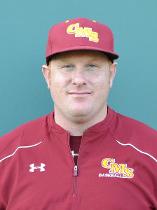
Morgan Cummins was an assistant coach for the Claremont-Mudd-Scripps Stags for two years in 2008 and 2009 and was named the program's head coach in 2015. For the previous five years he coached in a variety of roles at Coronado High School. In 2014 he served as the interim head varsity coach and led the team to the CIF quarterfinals.
As a player for CMS, Cummins was the team captain for three seasons, a NCAA Division III first team All-American, four-time All-Conference selection and a two-time All-West Region player. He also is a CMS Wall of Fame Scholar Athlete. Following his career at CMS, Cummins continued his playing career for a season in the Florida Marlins organization for the Class A Jamestown Jammers.
Cummins graduated from Claremont McKenna with a Bachelor of Arts in History and Government in 2007 and in 2012, completed his master's degree in school counseling at National University.
Inside Pitch: What is a typical "day in the life" for you during the fall/spring/summer?
Morgan Cummins: In the fall our players are on their own to complete the offseason training program. I equip them with a Division I-caliber program and it is up to them to find the time in their schedule to fit it in. Due to our high academic demands, some days are better than others for how much each player can get in. Captains usually run some practices on the weekends when there is less class and it is easier to get everyone together. In November, we have three weeks of workouts as a team. The typical week is three practices a week for two hours each. After that period, players are on their own again to complete the training program.
In the spring, we come back a week early, where we get one week to just be "baseball players." Practices and games six days a week consumes the majority of the spring.
In the summer, some of our players choose to do internships while others play summer baseball.
IP: What is a typical day in your student-athletes lives?
MC: Our players typically have four hours or so a day of class, two to three hours of training/baseball, and four hours of homework/reading/studying.
IP: What is practice like for your teams?
MC: We typically start with a dynamic workout and shoulder warmup before throwing. After that, we incorporate individual defensive drills, a team defense period, batting practice and finally a conditioning period. We focus on instruction and repetition of fundamentals.
IP: How would you speed up the game?
MC: Ensure teams hustle on and off the field and make sure your pitchers throw strikes!
IP: What is the most overrated "tool" in baseball? The least?
MC: I think the most overrated tool is speed (unless you are under 6.8 60 yd dash) and the most underrated tool is understanding the game and knowing how to read hitters/pitchers.
IP: What is the most "overcoached" subject in baseball? The least?
MC: The most over coached subjects are swinging with your bottom hand and getting strike one. The least coached subjects are hitting with your top hand, throwing strikes in 1-1 counts, and getting shutdowns when your offense scores.
IP: Would you rather see high school players participating in multiple sports or specializing in baseball?
MC: Playing two sports is good because it works on our ability to compete and face adversity, as well as give your throwing arm a couple months of rest. Playing more than two can be tough because it doesn’t give you an offseason to work on your game.
IP: What are your thoughts on technology, cell phones and the "millennial" generation?
MC: Technology is helping players get more visual information faster. This helps them see what they are doing and makes it easier to make adjustments.
IP: How when do you implement video/film for the players in your program?
MC: We use video during scrimmages and games so our players can see what they are doing when competing.